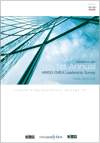 The Annual HIMSS Leadership Survey has a strong tradition of reporting on the opinions of information technology (IT) executives from healthcare provider organisations across the U.S. regarding the use of IT in their organisations. For the first time, HIMSS EMEA is turning this same focus across Europe, the Middle East and Africa, reporting on the information communications and technology (ICT) issues that are relevant to senior healthcare management in this region.
The Annual HIMSS Leadership Survey has a strong tradition of reporting on the opinions of information technology (IT) executives from healthcare provider organisations across the U.S. regarding the use of IT in their organisations. For the first time, HIMSS EMEA is turning this same focus across Europe, the Middle East and Africa, reporting on the information communications and technology (ICT) issues that are relevant to senior healthcare management in this region. The study was designed to collect information about IT priorities, technology adoption, application usage and other crucial factors in the use of IT to enhance healthcare.
This report was sponsored by Cisco. Support for this research also came from: C2C, European Health Telematics Association (EHTEL), European Federation of Medical Informatics (EFMI), Tekes - the Finnish Funding Agency for Technology and Innovation, SITRA (the Finnish Innovation Fund) and the Swiss Society for Medical Informatics (SSMI).
Contents
1. Executive Summary
2. Methodology
3. Profile of Survey Respondents
4. ICT Priorities
5. ICT Barriers
6. ICT Applications
7. Technology Adoption
8. ICT Staffing
9. ICT Budget
10. About HIMSS
11. About HIMSS EMEA
12. How to Cite This Study
13. Survey Supporters
14. Survey Sponsor
15. For More Information
Download "1st Annual HIMSS EMEA Leadership Survey" Report (.pdf, 5,47 MB)
Related news articles:
- HIMSS EMEA Celebrates One-Year of Dedication to Providing Global Leadership and Regional Services
- HIMSS EMEA Leadership Survey
About HIMSS
The Healthcare Information and Management Systems Society (HIMSS) is the healthcare industry's membership organization exclusively focused on providing global leadership for the optimal use of healthcare information technology (IT) and management systems for the betterment of healthcare. Founded in 1961 with offices in Chicago, Washington D.C., Brussels, and other locations across the United States and Europe, HIMSS represents more than 20,000 individual members and over 300 corporate members that collectively represent organizations employing millions of people. HIMSS frames and leads healthcare public policy and industry practices through its advocacy, educational and professional development initiatives designed to promote information and management systems' contributions to ensuring quality patient care.
For further information, please visit:
http://emea.himss.org